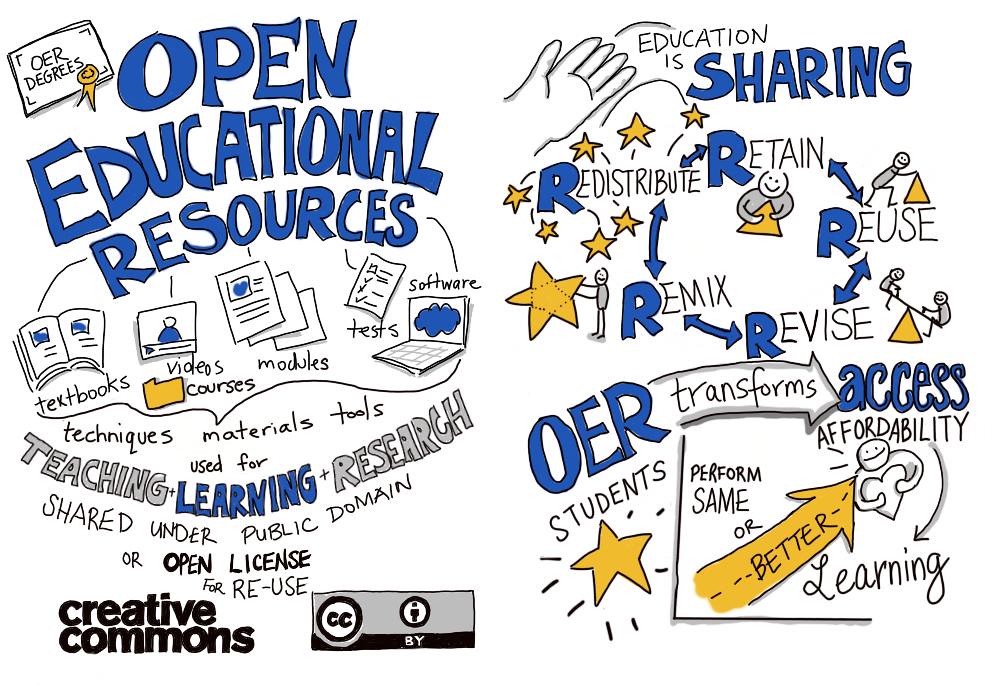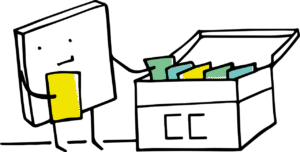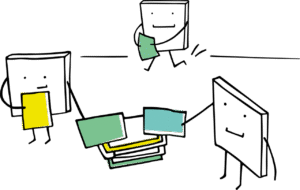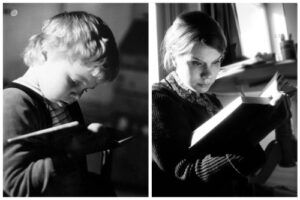Open Education is a Mindset

This past week Alan Levine joined our class leading a discussion on Open Education. Alan Levine is the Director of Community Engagement for Open Education Global. He also actively shares and reflects on online creative technologies on CogDogBlog. After Levine’s talk I visited the blog. In addition to his posts on open education, and web tools, his value of regular creative habits comes through in many of the posts I read including photos shared to a daily photo challenge that he has contributed to for 18 years on Flickr, and ds106 Daily Create an open digital storytelling course. He also shares serendipitous stories that have happened to people from sharing openly online and invites contribution to this collection of over 131 stories.
We all start out our educational careers (meaning when we were in kindergarten) intrinsically knowing the value of sharing. Somewhere between there and graduate school we loose track of this simple concept, be it worrying about the intellectual property rights, fearing theft, or just questioning the value of what we do.
The value of sharing underpins Levine’s commitment to Open Education. He reflects on openness in one blog post, “Openness- goes beyond the sky roof of courses, open resources, licenses, etc. … Even more than an attitude, it’s a mindset, it’s a way of being without having to think about it.” Levine candidly talks about openness in a YouTube video shared by Martin Weller. For someone to rationally understand openness he relates they need to make a personal connection to openness. Perhaps this is why in class Levine asked us what associations we make with Open Education and where we find our resources. Experiencing the value of sharing is so much more powerful than just knowing about the importance of sharing.
Removing Barriers

I appreciate the work Levine and others are doing to promote Open Education. The video Why Open Education Matters explains the value of online resources that are open; they are free, able to be shared, made by respected institutions ensuring their quality, can be edited to ensure they are current and may be adapted to meet the needs of different audiences. I took the time to explore Open Education Resources (Pressbooks from post-secondary institutions in Saskatchewan.) A link from Saskatchewan Polytechnic took me to the Pressbooks Directory.

I was impressed that over 8,000 open access texts exist from institutions. I can recall spending thousands on textbooks earlier in my education career for textbooks. I largely financed my education with student loans, and even though I recognize my privilege, at that time, it was difficult, and in many instances, avoiding the cost of texts I would need to visit the library to borrow the textbook copy on reserve. Cited reasons for using OER by ecampusontario echo alleviating financial barriers especially for students from disadvantaged socioeconomic backgrounds.
Learning is Participatory: From Inspiration to Innovation
The social online platform Medium identifies how Gen Z is redefining the digital landscape. “Gen Z has never known a world without the internet, which makes them digital natives who are comfortable creating, consuming and sharing content.” The Ted Talk Laws that Choke Creativity by Larry Lessing, founder of Creative Commons also highlights that the current generation are not passive consumers. Rather they are taking user-generated content and remixing it “to say things differently.” Lessing advocates for artists and creators to embrace this shift.
Ze Frank, in the Ted Talk My Web Playroom invites participation in various projects emphasizing that adaptation leads to new understandings and connections.

One project, I have seen is the Young Me Now Me project shared in various forms on social media where people shared a childhood photograph of themselves and restaged it as an adult.

Another project was Angrigami where people took hate comments and made them into something beautiful. This project turned criticism into something meaningful. The final project he shared moved me. In this project a woman emailed him about feeling anxious. He gathered recordings and made a compilation of all of the voices. He shares, “when you put them together, something magical happens, something absolutely incredible happens, and all of sudden I get a chorus around the world.” By individuals sharing and these voices being remixed something new was created. If it had just been Ze Frank’s voice it would not have been as powerful.
Reflecting & Application to My Own Personal/Professional Context
Levine explores openness as mindset of sharing, and remixing to connect with others. I align with this mindset; sharing ideas, creativity and stories online has been a way for me to connect with others. I am impressed at the creative habits that Alan Levine has cultivated. After visiting Levine’s Flickr account I checked to see if the Flickr account I started in 2010 was still there, and it was! I imagine if I had been committed to a daily practice of photography I would have grown in these skills. As I reflect on my life and how I have dabbled in many interests, while I feel a little disappointed at my lack of focus, I can see how I have made connections that I may have missed if I stayed in one lane. A passion for art, for instance, may influence how I teach math, or an interest in narrative may shape how I communicate ideas. Cross-pollination is where creativity thrives. In my teaching career and with my work in arts and culture I have experienced how building community and working collaboratively creates opportunities, and fosters a sense of belonging and shared purpose. I have experimented with ideas, and new ways of thinking through connecting with others.
I really like what you said about actually experiencing sharing vs. just knowing it’s importance. It’s very easy to fall into the trap of knowing something is probably the right thing to do, but not making the extra effort to see it through. However when it comes to sharing in education the payoff is worth it every time.
In my work as an instructional designer we often try to push instructors in the direction of using Open Textbooks for the exact reason you mentioned. Post secondary education is expensive enough as is without needing to spend hundreds each semester on textbooks. If we can convince even one instructor to make this change it ends up saving students thousands each and every semester that the course runs. That is easily worth the extra effort it might take to hunt down a quality OER replacement textbook.
Also I just want to say thank you for sharing the Young Me Now Me and Angrigami projects. Both of which were so wholesome and truly warmed my heart!